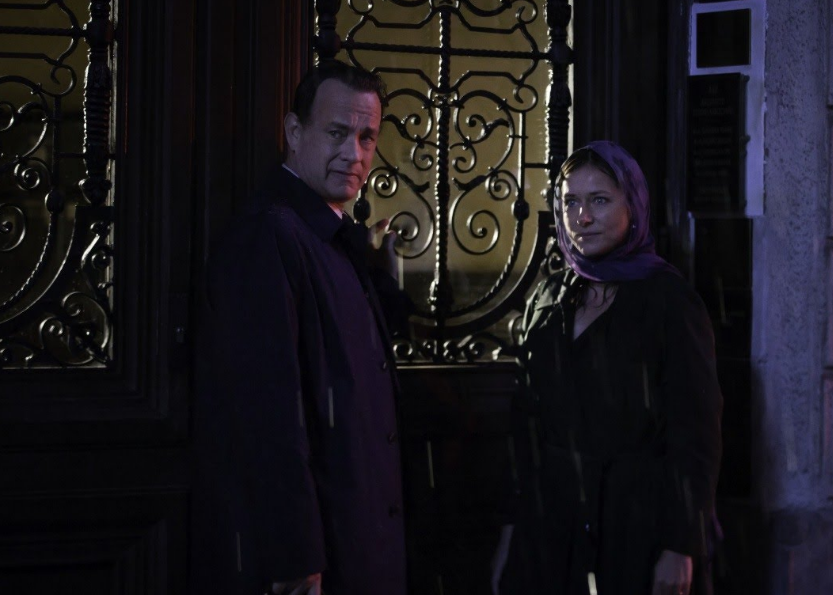It is never a good sign when the part of the film I’m most interested in is the score. Yet midway through Inferno, I stopped and thought to myself, “Is this soundtrack by Hans Zimmer?” I spent the rest of the film trying to decide if that was the case. (It was.) Indeed, Inferno does not have much to offer besides another solid Zimmer score, as Ron Howard directs Tom Hanks in a disappointing thriller based on the significantly more engaging Dan Brown novel.
Hanks and co-star Felicity Jones fail to elevate an uninspired screenplay from David Koepp. The film moves along deliberately and patiently in the first hour before kicking into overdrive and throwing twist after twist at the audience in the film’s second half. The result is an occasionally entertaining, but consistently muddled mess that lacks the intrigue of The Da Vinci Code or Angels and Demons.
The film begins with the villain, a billionaire determined to unleash a plague on humanity, committing suicide. Within the first two minutes, the audience understands the villain’s plan and his motivations. Next, the film cuts to Hanks’ Professor Robert Langdon waking up in a hospital bed in Florence, Italy with a head wound and no memory of how he got there. This is a clever move on the film’s part. By having Langdon piece together the details of what has happened, the audience gets to follow the story along with him in an organic manner.
After a good introduction, the film begins to drag as the story unfolds by introducing a myriad of unnecessary subplots. Irrfan Khan plays a character mysteriously titled “The Provost” who works for a dark and shadowy organization, and his motivations, as well as his contribution to the plot, are never made clear. Omar Sy turns in a commendable performance as a secondary villain who pursues Langdon, but he is plagued by weak development. These divergences, which include a love interest who is suddenly introduced over halfway into the film, only cause further confusion for the viewer.
This lack of cohesion and character development gets at one of the biggest issues with the film: none of the characters feel like actual human beings. Langdon is a likeable protagonist, but the other characters are mere mouthpieces as they spout exposition to keep the film’s story moving forward. The lackluster plot simply does not have the legs to carry the film without compelling characters.
In the series’ previous two films, weak characters did not prove fatal due to those films’ compelling storylines. Inferno’s story has an interesting start but is so convoluted that by the time the film rushes to the ending, the payoff is not worth it. The film briefly hints at an interesting discussion of issues such as overpopulation, eugenics, and the impacts of a plague on the non-human world. Yet it never engages with these issues in any depth. Instead, Howard and Koepp get bogged down in trying to surprise the audience with character betrayals and red herrings, without ever truly achieving the intended effect. What was supposed to be a shocking twist that occurs midway through the film instead had the audience laughing at the overwrought writing.
Inferno burns out at about the one hour mark, a time when the film needs the audience’s investment so that the plethora of plot revelations and developments make sense. The issue is that the film lacks any sort of edge, as its story is that of a generic action film. The Da Vinci Code made bold and controversial claims about the Catholic Church, Angels and Demons went into great discussion of the Illuminati conspiracy, and Inferno, well, does not have anything nearly as interesting to offer.
Howard provides some beautiful shots of Italian architecture, yet otherwise his directing comes across as overdone. In the film’s opening, as Langdon is recovering from his head wound, he has visions of Dante’s Hell realized on Earth. At first, these scenes are disturbing and disorientating, but Howard goes back to the well about six too many times. The use of shaky-cam, jump cuts, and shocking imagery becomes bland and uninspired through Howard’s overuse. He would have been better-off peppering in fewer of these scenes to maximize their impact.
The Robert Langdon series has been noteworthy for the arguments surrounding the stories’ depiction of the Catholic Church and its claims about the Church’s history. This spurred the success of the first two films in the series. This formula, it seems, has run its course, and Tom Hanks should leave the adventuring to Harrison Ford or even Nicolas Cage (when is National Treasure III happening?), as Robert Langdon appears to be a one-trick pony. Inferno’s worst sin is how eminently forgettable it is.





